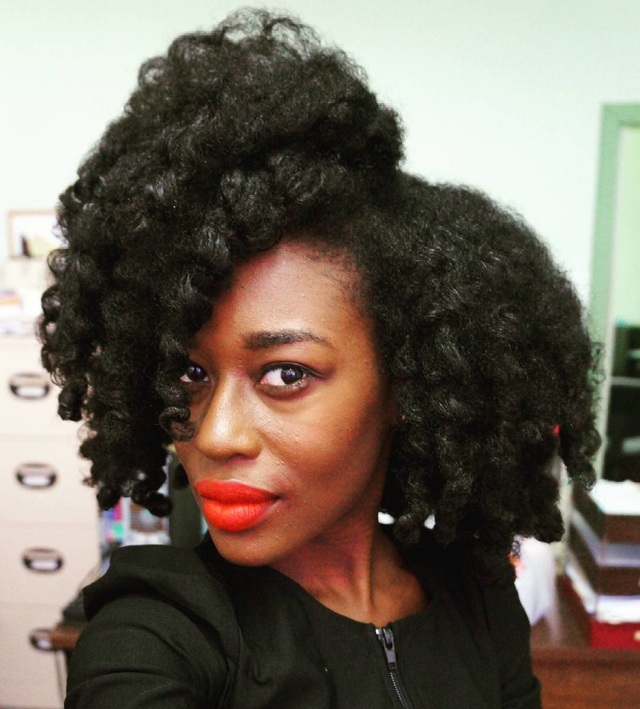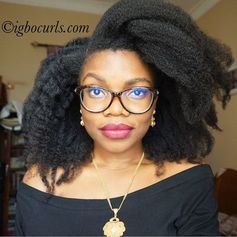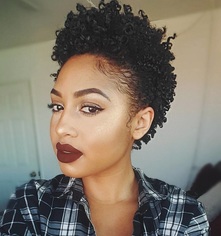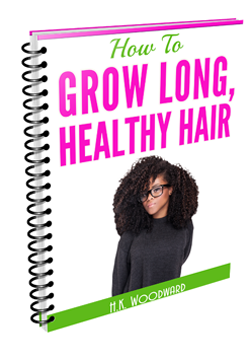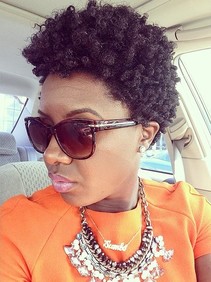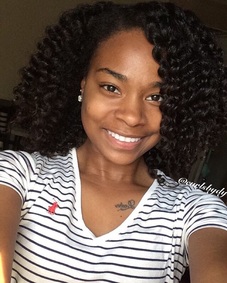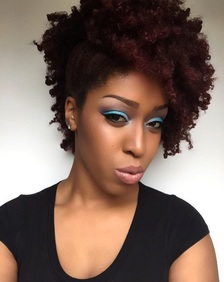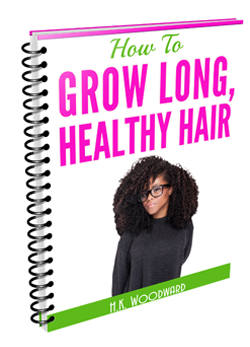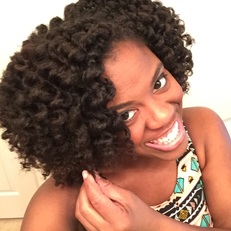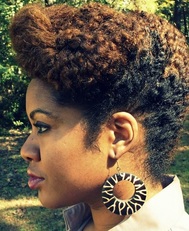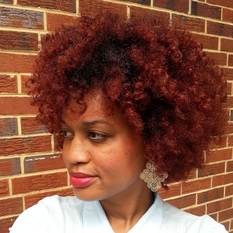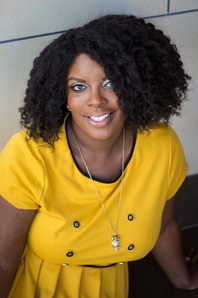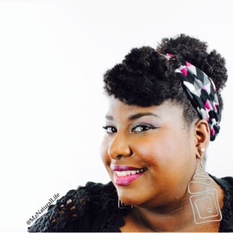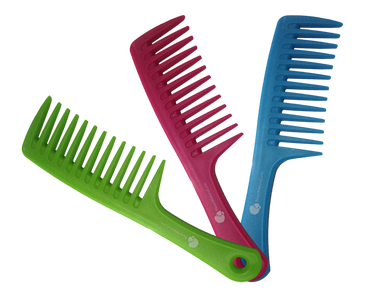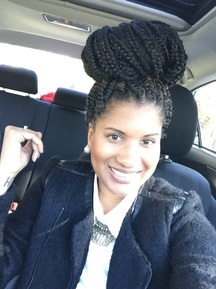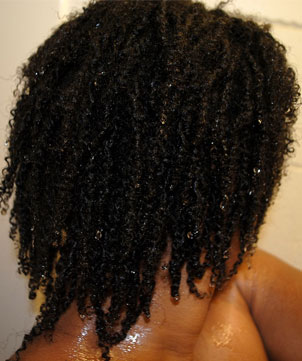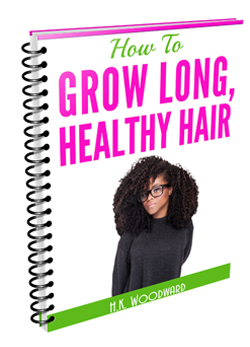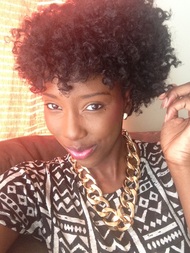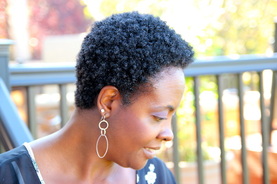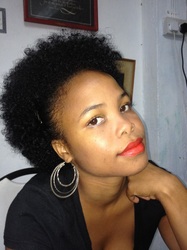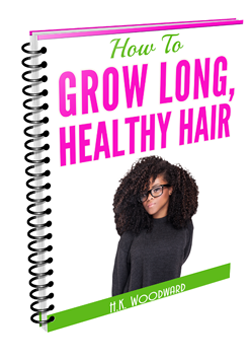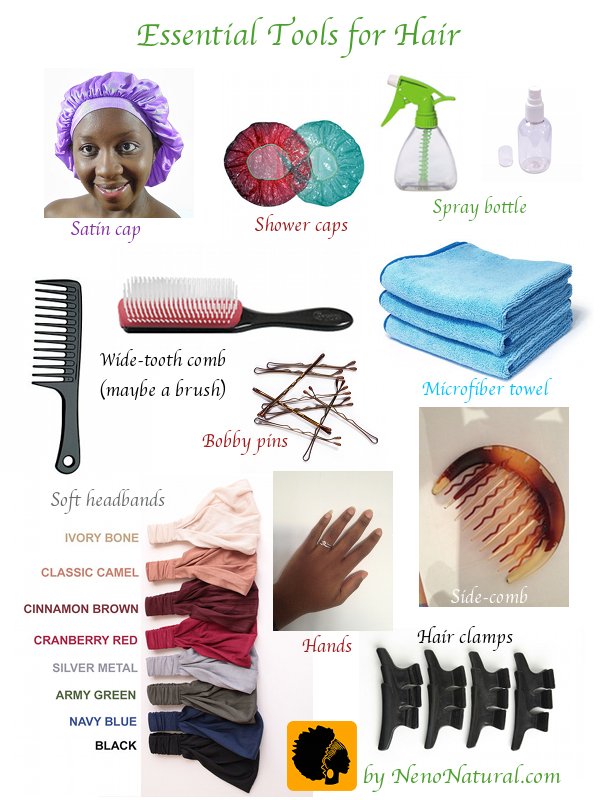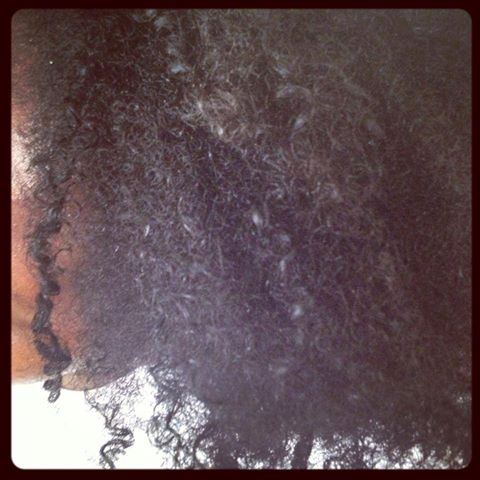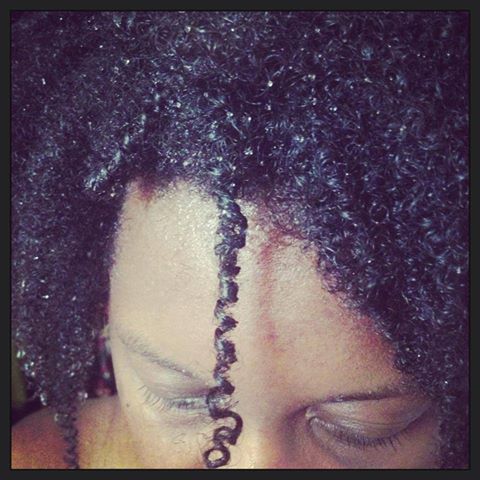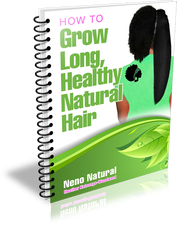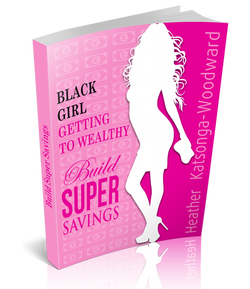|
Natural hair doesn't "like" being handled when it's dry or in fact even when it's very wet. Before detangling your hair you should "plasticize" to soften it and make detangling easier.
What is a plasticizer? It's anything that softens hair and makes it easier to detangle and comb. What products can be used for plasticizing? Water, leave-in-conditioner, a creamy moisturiser, oil and even a little rinse-out conditioner. Basically, anything that makes the hair more slippy. My hair is quite thick and course so I find that thick, creamy moisturisers and leave-in conditioners work best for plasticizing my hair. I usually also follow with an oil to seal. For thin hair you might prefer to use just the oil or a very loose conditioner. How much plasticizer should be added to hair? If you're about to wash your hair, then you can add as much as you want. However, if you just want to detangle and style your hair for the day then use just a little bit. I probably use about a tablespoon's worth given my hair thickness. If your hair's thin you might prefer to use less product so that your hair isn't weighed down. Any other tricks? Why yes, when I am plasticizing my hair for styling rather than before my weekly wash I cover my hair in a shower cap whilst I shower and get ready as it helps my hair soften and makes it far easier to handle.

Washing your hair under a shower is highly convenient for many because tangling can be minimised.
Keeping hair strands dangling dowanwards prevents the tangling that occurs when you lean over a bathtub then stand back up. In addition, you can have a shower at the same. One problem. Black hair can be very delicate so if your shower produces water at a very high pressure delicate hairs will break. Have you ever seen dirty walls and garden floors being cleaned using a strong jet of water? That shows just how powerful water under pressure can be. If your shower's pressure can be adjusted, lower it a little bit when your head is under the shower just to make sure you don't incur unnecessary breakage.
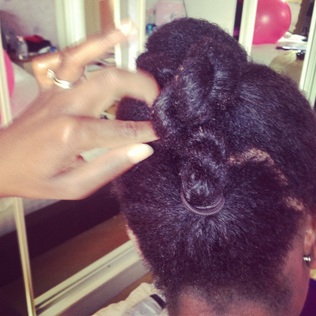
Co-washing simply refers to washing your hair with conditioner. When you co-wash your hair you do not use any shampoo at all.
Deep conditioner is a specific type of conditioner. It is very rich in ingredients that nourish hair. Deep conditioners are not designed for daily use. The five main types of conditioner are:
Not all conditioners are made equal! Some are designed for daily use, others for weekly use and yet others for less than weekly use. If you wash your hair more than once a week then you need to keep a deep conditioner for use once a week and an instant conditioner or cream-rinse conditioner to use in between. 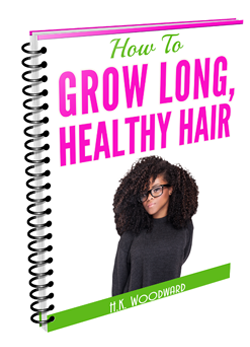
10 Tips on How To Detangle Natural Hair With Minimal Breakage (great for both kids and adults)11/3/2015
1. Detangle when you have two or three free hours, e.g. when you're watching TV.
2. Do not detangle dry hair. Spray the hair with just water then add some detangling cream or a leave-in conditioner or even a rinse-out conditioner to soften the hair further, even if you're about to wash. You don't need much product, a little goes a long way. 3. Use a high quality wide tooth comb with smooth edges. 4. Don't detangle on an empty stomach, you're only going to rush and do it badly. 5. Move section by section. 4 to 12 sections should be enough depending on the thickness of your hair and how tangled your hair is. Even if I don't pin my hair up I don't attempt to work on all the hair in one go. I focus on one area at a time. 6. Ensure that your fingernails are well manicured and that you don't have any dry skin that hair will get caught on to. 7. Detangle with your fingers first. Fingers are better able to navigate knots. 8. Work your brush or comb from tips to roots. I have also discovered that finger-combing only is not for everyone. If you have very thick or course hair you need to use a comb and possibly a brush to some extent. Thin, fine and loosely curled hair fares much better on a finger-combing only routine. 9. Twist the detangled section so that it doesn't retangle or get mixed up with hair that has not yet be detangled. 10. Always detangle before you shampoo hair and then again after you have applied conditioner. Remember that damaged hair is more prone to breakage than healthy hair so handle weak and damaged hair with extra care :)
You cannot deep condition your hair using a regular conditioner. That’s the first thing you need to keep in mind. A regular conditioner only acts on the surface of hair and does not have the ability to penetrate any further.
If your hair is damaged it means the cuticle layer is uneven. In this case you need a deep conditioner to penetrate through to the damaged areas for repair and maintenance. This repair and maintenance is not permanent, it only last a few days, that is why you need to deep condition at least weekly. Overall, a regular conditioner:
And a deep conditioner also:
What about if your hair is healthy? Is a deep conditioner still needed? If your hair is healthy the cuticles are lie flat and don’t have holes and gaps of damage. This means that a deep conditioner will mostly act on the surface; however, as damage can’t be observed by the naked eye, any small areas of damage will be fixed. With healthy hair a weekly deep condition is not vital but it will definitely help to maintain the healthy condition of your hair. Deep conditioning healthy hair is similar to a person with a fabulous diet also taking a vitamin pill – it isn’t necessary but it ensures they are definitely getting everything their body needs.
Not all conditioners are made equal! Some are designed for daily use, others for weekly use and yet others for less than weekly use. To reduce frizz: leave a little rinse-out conditioner in your hair. This works best for thick or course hair, according to the Science of Black Hair. 1. Instant Conditioners
2. Cream-rinse (a.k.a. creme-rinse) conditioners
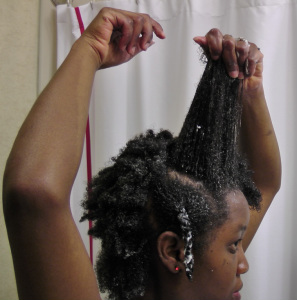
3. Deep conditioners
4. Moisturising conditioners
5. Protein conditioners
Protein reconstructors / treatments
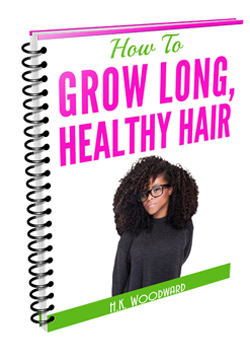
Get your FREE ebook on How To Grow Long, Healthy Natural Kinky or Curly Hair. Ref: The Science of Black Hair, pages 78-80
A while ago I went on holiday and unfortunately discovered that the conditioner I had taken does not work for my hair.
I was away for two weeks in a country where products for natural black hair are not available; I desperately needed to condition my hair so I googled for simple, natural methods and was surprised to find that the ingredients in Neno Natural's Hair Growth Stimulator were mentioned as being good for conditioning hair and for hot oil treatments. I washed my hair with water, sprayed Neno Natural's Hair Growth Stimulator on, put a shower cap over my head for a couple of hours, then I rinsed my head with cold water and plaited it. I didn't add any moisturiser at all because my hair was already adequately oily. What you see me unplaiting here is the result of that hair conditioning session. I kept the plaits in for the duration of the flight back and for a couple of days when I got home. Given the choice, I would rather mix essential oils with my conditioner but I am very happy with the results I achieved using just Neno Natural's Hair Growth Stimulator. If you want to make your own oil use any one of the following as a base:
Then to that mixture add three or four of the following essential oils:
That's pretty much it! Enjoy. The above said, note that this was a short-term solution and that this is not a "real conditioner" but something you can add to your routine. It is essentially a hot oil treatment. At the moment I do a hot oil treatment similar to this every other week before washing and conditioning my hair. 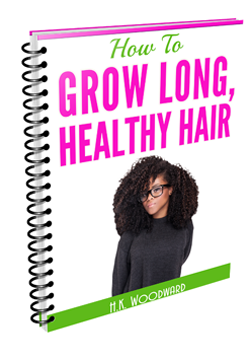
Get your FREE ebook on How To Grow Long, Healthy Natural Kinky or Curly Hair. 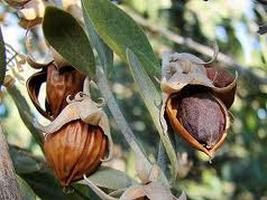 Jojoba seeds Jojoba seeds
When I decided to go natural, I knew I needed a good, pure oil. After some research jojoba became my oil of choice. Two key factors sold me on jojoba:
a) The fact that jojoba is the only oil whose molecular structure is similar to sebum (the oil that the scalp naturally produces) and b) It has a very long shelf life. The only oils I know to have longer are castor oil and coconut oil.[i] I shouldn’t have really cared about shelf life because as it turns out I go through my bottles pretty rapidly! Jojoba oil is derived from the seeds of evergreen jojoba shrubs (Simmondsia chinensis). It is native to Arizona, California and Mexico. 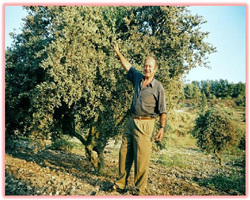 Jojoba evergreen shrub Jojoba evergreen shrub
It is one of the most nutrient rich and expensive botanical oils. Its benefits to hair include:[ii]
1. It is readily accepted by the scalp and does not mess with the scalp’s natural balance. This is because of its similar molecular structure to sebum (the scalp's natural oil). 2. It is reputed to have antibacterial properties. It soothes the scalp and can be used to treat dry scalp problems and dandruff. 3. It is composed of 98% monounsaturated fats and 2% saturated fats so it can penetrate the hair follicle and strengthen hair fibres from the inside. 4. Jojoba also hydrates hair from the inside of the hair shaft. So it works well as an agent for reducing hygral fatigue (the swelling and shrinking of hair as it it gets wet and dries that can weaken the hair fibre over time). 5. As a conditioner jojoba helps to add shine, elasticity and softness to hair. 6. Jojoba can be used to add volume to thinning hair. It adds volume and body to hair strands thereby giving an appearance of thickness. That said, note that if you have thin hair you can’t convert it to thick hair. That’s genetically predetermined. 7. You can mix jojoba oil with essential oils and massage the mixture into the scalp to stimulate blood flow to the scalp and encourage hair growth. I do this almost daily; jojoba is light and non-greasy. 8. Jojoba is an emollient – it fills in cracks that are on the surface of the hair cuticle, i.e. it helps to repair hair damaged by heat and styling. 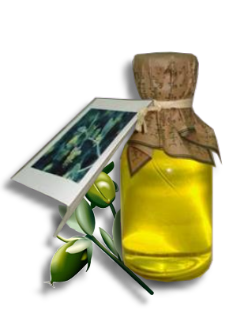
How can you use jojoba?
If you are using a shampoo that strips your hair, add a couple of tablespoons of jojoba oil to it. In this way your hair won’t get sucked (too) dry. Neno Natural’s Hair Growth Stimulator is composed of 50% jojoba and 50% grapeseed oil as the base. Chemical composition:[iii] Very high in monounsaturated fatty acids (98% of total fatty acids); also rich in Vitamin A, Vitamin B1, Vitamin B2, Vitamin B6, Vitamin E (very rich in), Myristic Acid (a saturated fatty acid), Plant Wax (similar to sebum). As you’re shopping for your jojoba note that unrefined jojoba is golden (you want this type); refined jojoba is clear and odourless. You might also like: THE best oil for natural hair. A mega summary! The supersonic benefits of argan oil on natural black hair 6 fabulous benefits of avocado oil on natural hair 8 Benefits of Castor oil for natural hair & a warning! 6 top benefits of coconut oil - a MUST for every natural hair regimen! 5 benefits of sweet almond oil on natural hair 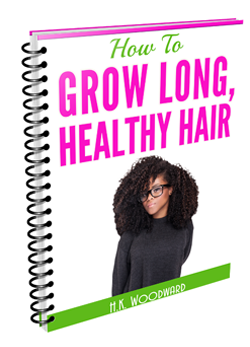
Get your FREE ebook on How To Grow Long, Healthy Natural Kinky or Curly Hair. References [i] Jojoba oil (wikipedia) [ii] Is jojoba oil good for thinning hair; Jojoba oil for dry hair; thejojobaoil.com; Jojoba benefits [iii] Jojoba carrier oil 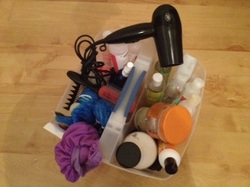 Heather's hair caddy Heather's hair caddy
This is an FAQ for sure!
To answer the question, I have an Amazon store with the products that I think work well for hair based on: a) my own usage b) usage by other naturals and most importantly c) reading the product list. Note that I am not the seller of most of these products. Hair care management is most important when you're trying to grow long, healthy hair but products are just as important because the wrong ones will spoil all your efforts. To avoid information overkill, at any one time I'll only ever have a maximum of 9 recommended products in a given category. There's no single product that will work well for everyone because we all have different hair textures and needs. Here's how to shop for good products: 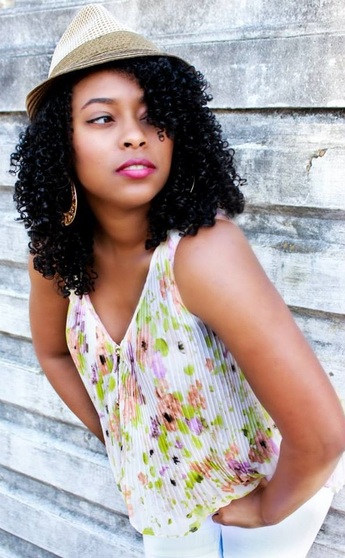 Click for Queen Dominique's hair styles, journey & regimen Click for Queen Dominique's hair styles, journey & regimen
SHAMPOO
A GOOD DEEP CONDITIONER
After deep conditioning your hair it should feel soft, springy, strong and "fresh". LEAVE-IN CONDITIONERS (aka Moisturizer)
OILS You want high grade oils, even when they are not organic you will get a better quality product if it has been cold pressed (i.e. refined without heat). I'm naturally going to recommend my awesome hair growth oil blend - you can use it for hot oil treatments and scalp massages: 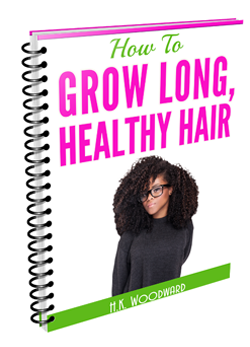
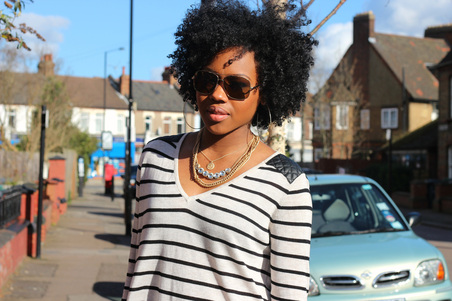 Click for Queen Teshna's hair styles, journey & regimen Click for Queen Teshna's hair styles, journey & regimen
BUTTERS
I would go for something shea butter based. Butters are great when applied to wet hair. CHEMICALS TO AVOID There are certain chemicals natural black hair does "not like" because they dry hair out or coat hair in a film that makes moisturising diffifult. Some chemicals, e.g. Parabens aren't bad for hair as such but have been linked to cancer. Whenever I buy hair products I go for those that are 100% made from natural materials. I would avoid anything with:
You don't need: a protein conditioner You would only use one if you had hair damage or periodically on relaxed hair where the protein has been depleted. Protein conditioners:
TOOLS The picture below shows all the basic tools you'll need to take good care of your hair. Every product is available in the Neno Natural Amazon Store. I talk about each tool in: 9 Essential must-have tools for natural hair management 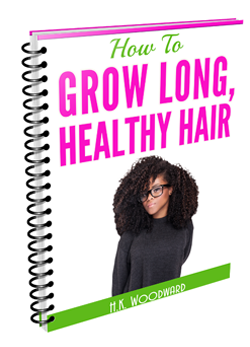
Get your FREE ebook on How To Grow Long, Healthy Natural Kinky or Curly Hair.
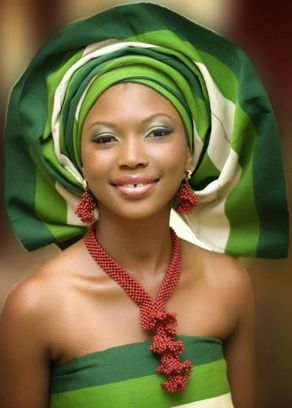 Click for my Pinterest inspiration board Click for my Pinterest inspiration board
A detangler can be a rinse-off or leave-on product.
If the detangler is designed to be rinsed off you would still need to follow it up with a conditioner because if it's been specially created for detangling then it will not contain much in the way of conditioning ingredients. That said, a detangling conditioner is designed to be both a great rinse-off detangler and a fantastic conditioner. It does both jobs. Such a product could be used before a shampoo as a pre-poo detangler as well as after a shampoo to condition the hair. The pre-shampoo application would be mostly washed out by the shampoo thereby making an additional post-shampoo application necessary. 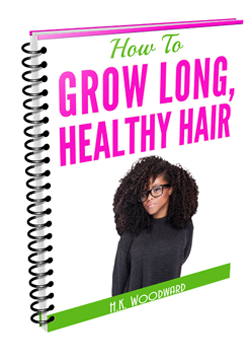
|
I now blog about wealth creation - so if you have any money questions meet me there, you can do all sorts of cool things like leave me a voicemail.
By Heather Katsonga-Woodward
I was a natural hair blogger and mixtress living between London & Chicago from 2012 to 2017. I always thought I was 4C but some say 4B; images below - you decide! Heather xx Categories
All
Archives
November 2016
|

